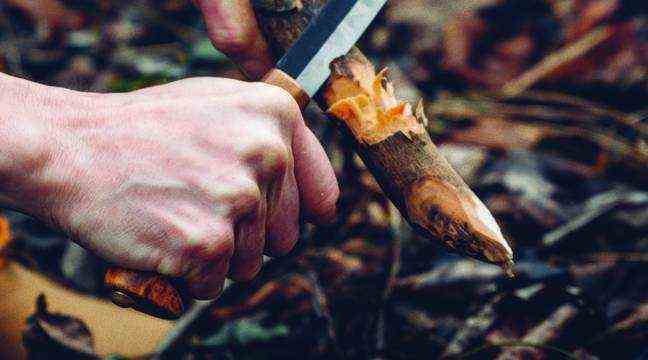Anthropologist Mathieu Burgalassi publishes the result of several years of investigation into survivalism – Sergey Tinyakov / Getty Images
- Published this Thursday, the essay with autobiographical accents by Mathieu Burgalassi paints an unprecedented portrait of the followers of survivalism, far from the caricatures that surround this movement.
- For this doctoral student in anthropology, survivalism can be defined as a “practice bringing together individuals who deeply believe in the imminence of a civil war and are preparing accordingly”.
- Far from “curing” the fears of its followers, survivalism helps to strengthen them by proposing particularly violent practices.
“Survivalists are neither end-of-the-world freaks or gentle hikers. Far from the clichés long associated with the movement, the anthropologist Mathieu Burgalassi publishes this Thursday the result of four years of investigation into survivalism. Political essay and autobiographical story, Fear and hate * analyzes the motives that push some citizens to prepare for the worst. Nourished by its immersion in the environment and by numerous interviews carried out in France and the United States, this survey highlights the weight of fear and political discourse on insecurity in the survivalist commitment.
How can we define survivalism?
To define it, we must already say what it is not. Survivalists are neither end-of-the-world freaks or gentle hikers. Survivalism is part of a relationship with a fear, that of the imminence of a crisis. It can be a pandemic like the one we are experiencing with Covid-19, an ecological or economic crisis. Basically, what this crisis will be does not matter, what is important is that it will be so important that it will bankrupt the State.
According to survivalists, faced with food or medical shortages, faced with the disappearance of institutions – hospitals, police, army… – man will become a wolf for man. Their bet is that necessity turns people into monsters. That’s why they learn shooting, self-defense or participate in paramilitary survival courses. Not out of love for violence, but to protect themselves from a scenario of violence that they feel is inevitable.
How do you explain it?
What I noticed during my investigation is that survivalists do not feed on marginal political ideas. They emanate from dominant speeches carried by the entire political spectrum, from the Minister of the Interior to Emmanuel Macron through the LR candidates for the presidential election to the Socialist Party. The security issue has been at the center of political debate for years. However, talking about insecurity every day on television is not a zero-sum game.
When a survivalist watches television, he is like you and me: he does not always have the necessary perspective to understand that he is facing a political strategy. This political discourse creates a deep feeling of fear and, to protect themselves from it, some people will engage in practices that will allow them to put something between themselves and this fear. Except that these practices lead to learning violence. And the more we learn about violence, the more we feed it. Survivalism does not cure fear, it feeds it.
Are there any links between conspiracy and survivalism?
Conspiracy is irrelevant for analyzing the springs of survivalism. What makes the fear of survivalists are ordinary speeches, not marginal theories broadcast on the darknet. Designating members of minority groups as conspirators helps to disqualify them without being interested in their speech. When we put an individual in the “conspiratorial” box, we are not going to listen to what he has to say.
What place does hatred of the other have in adherence to survivalism?
When I was in the field, I met people with very racist speeches. Some said to me: “I am preparing for a war with the Arab-Muslims”, “for a confrontation against the Maghreb and African populations”. And, right after, they would say to me: “But I’m not a racist. I said to myself: “Why don’t people who talk like that think of themselves as racists? Well, because security policies don’t just designate a risk and create a fear, they also designate populations and groups at risk. Some populations are blamed for insecurity.
When Gérald Darmanin proposes a law like the law against separatism and he links that to the enslavement of French society, in reality he says: “You are exposed to risks, to violence, and there are responsible. Often it is French Muslims.
After having embraced survivalism and having studied it, what is your view on this movement now?
I joined when I was a student and in a very difficult social situation. Survivalism, at the time, came to respond to anxieties linked to everyday life. I did not see survivalism through the prism of a coming civil war. The fear of not being able to eat the next day, which may seem irrational, was nevertheless a reality for me.
But when I saw the violence of the movement, that personal interest in survivalism turned professional. I took a step back and, as my investigation progressed, I detached myself from it. The violence that I observed was more and more important, and the one to which I was exposed was insane. I couldn’t stand it anymore. When I ended my research, I naturally walked away from the movement. Today, I try to have an optimistic view of things. Maybe it’s when you believe in collapse that collapse happens. But we can also decide to become an actor in the world we live in and do beautiful things.
*Fear and hate. Survivalist survey, by Mathieu Burgalassi, Michel Lafon editions, 253 pages, 17.95 euros.

